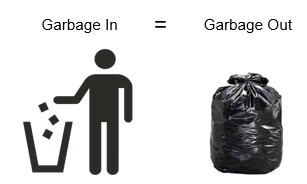
Your data inputs used in your reporting must be accurate if you are to make better decisions through your business reporting. If the data inputs are accurate, you’ll have accurate information to act on.
On the other hand, inaccurate data will result in misleading information. This is particularly true when you have data coming at you from every corner of the business. It’s tough to have confidence in your business reporting if you don’t have confidence in the data feeding into your reports.
Overview
GIGO is a computer science acronym that implies bad input will result in bad output. This same logic applies to business decision-making. If you decide to act based on your most recent P&L Statement and your chart of accounts is misaligned, then your financial statements will produce GIGO even if every transaction was recorded accurately.
You avoid garbage in, garbage out (GIGO) by designing your data-collection platform to feed you accurate data that is converted into information. By recording your financial transactions accurately, you ensure you don’t suffer profit losses from garbage-influenced decisions. Monthly bank reconciliations are the best way to confirm that your financial transactions are being recorded accurately. When your financial statements match your bank statements, you will not suffer from GIGO at the transaction level.
Bad information makes good decision-making harder than it needs to be. Correct this by making sure your business transactions are recorded accurately into the right accounts and that those accounts are correctly aligned in your chart of accounts.